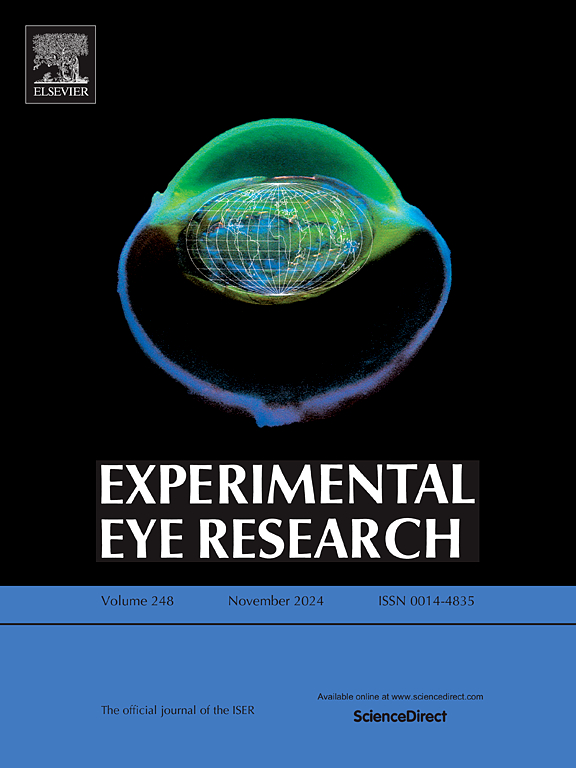Monochromatic light effects on refractive error, cone cell density and retinoic acid signaling in dorsal and ventral retina in guinea pigs
IF 3
2区 医学
Q1 OPHTHALMOLOGY
引用次数: 0
Abstract
Cone cells have been found to influence refractive states. This study investigated whether cone cells and retinal acid (RA) plays a role in refractive states under monochromatic lights. Guinea pigs were exposed to blue (BL), green (GL), or white light (WL), respectively, for 8 weeks. Refractive error (RE), cone cell density, RA, retinoic acid receptor-β (RAR-β), collagen-I expression, and scleral thickness in dorsal and ventral eyes were assessed. Eyes exposed to BL showed a slower shift from hyperopia to emmetropia, particularly in the ventral retina, where higher S-cone density was linked to greater remaining hyperopia. In contrast, GL exposure led to myopic shifts, notably in the dorsal retina, where increased M-cone density was associated with greater reductions in refractive error. BL exposure resulted in similar decreases in RA and retinoic acid receptor-β (RAR-β) expression in both dorsal and ventral regions, along with elevated scleral collagen-I and thicker sclera. In contrast, GL exposure increased RA and RAR-β levels, while reducing scleral collagen-I and thickness. GL-associated changes in RAR-β expression and scleral thinning were more pronounced in the dorsal retina compared to the ventral retina, despite similar RA levels in both regions. These findings suggested that RA may not contribute to the hyperopic shifts with increased S-cone cell density in BL. However, increased RA and RAR-β may be correlated with ocular growth in guinea pigs exposed to GL, it may underlie myopic shifts with increased M-cone cell density.
单色光对豚鼠背侧和腹侧视网膜屈光不正、视锥细胞密度和视黄酸信号的影响
研究发现视锥细胞会影响屈光状态。本研究调查了锥状细胞和视网膜酸(RA)是否在单色光下屈光状态中发挥作用。将豚鼠分别暴露在蓝光(BL)、绿光(GL)或白光(WL)下 8 周。对屈光不正(RE)、视锥细胞密度、RA、视黄酸受体-β(RAR-β)、胶原蛋白-I表达以及背侧和腹侧眼睛的巩膜厚度进行了评估。暴露于BL的眼睛从远视向屈光转变的速度较慢,尤其是在视网膜腹侧,较高的S锥密度与较大的剩余远视有关。与此相反,暴露于 GL 会导致近视度数的改变,尤其是在背侧视网膜,M 锥体密度的增加与屈光不正的进一步减少有关。BL暴露导致背侧和腹侧区域的RA和视黄酸受体-β(RAR-β)表达类似减少,同时巩膜胶原蛋白-I升高,巩膜变厚。相反,暴露于 GL 会增加 RA 和 RAR-β 的水平,同时降低巩膜胶原蛋白-I 和厚度。与腹侧视网膜相比,背侧视网膜的 RAR-β 表达和巩膜变薄与 GL 相关的变化更为明显,尽管这两个区域的 RA 水平相似。这些发现表明,RA可能不会导致BL中S锥细胞密度增加的远视偏移。然而,RA和RAR-β的增加可能与暴露于GL的豚鼠的眼球生长有关,它可能是M锥细胞密度增加的近视转变的原因。
本文章由计算机程序翻译,如有差异,请以英文原文为准。
求助全文
约1分钟内获得全文
求助全文
来源期刊

Experimental eye research
医学-眼科学
CiteScore
6.80
自引率
5.90%
发文量
323
审稿时长
66 days
期刊介绍:
The primary goal of Experimental Eye Research is to publish original research papers on all aspects of experimental biology of the eye and ocular tissues that seek to define the mechanisms of normal function and/or disease. Studies of ocular tissues that encompass the disciplines of cell biology, developmental biology, genetics, molecular biology, physiology, biochemistry, biophysics, immunology or microbiology are most welcomed. Manuscripts that are purely clinical or in a surgical area of ophthalmology are not appropriate for submission to Experimental Eye Research and if received will be returned without review.
 求助内容:
求助内容: 应助结果提醒方式:
应助结果提醒方式:


